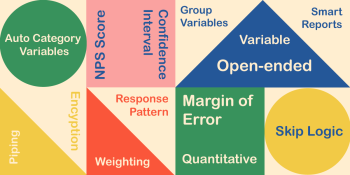The benefits of surveys for research include:
- Large-scale data collection
- Capture attitudes, behaviours, and opinions
- Build trust and loyalty
- Get ideas for additional offerings
Without research and feedback from your customers, employees, and stakeholders, it’s impossible to know how best you’re serving their needs.
In addition, you won’t truly understand your place in the market.
This means it’s important you add surveys to your research strategy.
Efficiently collect large volumes of data
Surveys benefit researchers by allowing you to get feedback from potentially thousands of people with a few clicks of a button.
With the right survey platform, you can design and distribute your surveys from one place. Then once you receive your data, it can be analysed within the platform and be used to create reports that provide the insights you need.
Surveys are versatile and can be distributed in multiple ways:
- Paper Surveys (hand-delivered or by mail)
- SMS
- QR Code
- Kiosk
- Social Media
With so many ways to reach your audience, surveys represent the best way to connect to a large group of people.
And with professional software there can be no limits to how much data you can receive.
Surveys are also cost effective when compared to interviews or focus groups.
With online survey platforms, you generally pay to subscribe to the platform and choose your data plan.
The more replies you expect to collect, the more cover you’ll need. This makes it convenient and ensures your outlay is kept relative to your results.
Another benefit of surveys and online survey software is that you can conduct surveys in multiple languages, helping you reach the wider community and ensure your feedback is representative of your entire audience.
More voices = better data!
Capturing opinions, behaviours, and attitudes
Surveys let you capture opinions, behaviours, and attitudes by using carefully structured questions and response formats that allow researchers to explore what people think, do, and feel.
Opinions
To capture opinions, surveys often use direct questions to ask people what they believe about a certain topic. For example, a workplace survey might ask: “Do you believe remote work increases productivity?”
To measure the conviction of opinions, researchers can use rating scales such as a Likert scale, where respondents indicate their level of agreement from “strongly disagree” to “strongly agree”.
Surveys can also capture preferences by asking people to compare options or choose between alternatives, which reveals how opinions vary across individuals or groups.
Behaviours
To understand behaviours, surveys rely on the honesty and accuracy of the participants.
A question might ask: “How many times have you shopped online in the last month?” or: “Which of these apps do you use daily?”
Answer options can be based around the frequency of using a service (never, rarely, sometimes, often, always) help measure how often these behaviours occur.
Researchers can also use recall-based questions, such as: “When did you last visit a doctor?” to gather information about past activities and decision-making patterns.
This can help researchers to predict future behaviour.
Attitudes
To understand attitudes, surveys explore how people feel about their experiences and environments.
This is often measured through sentiment scales, such as asking respondents how satisfied they are with a service, product, or relationship.
Attitudes can also be revealed through perception-based questions, where participants rate statements like “I feel my workplace supports my professional growth.” In addition, open-ended questions give respondents the freedom to describe their feelings in their own words, uncovering insights that structured questions may miss.
By allowing you to understand these three key areas at once, surveys provide a well-rounded view of people’s perspectives and lived experiences.
Build trust and loyalty
Surveys can play a powerful role in helping organisations build both trust and loyalty, but only when they are designed thoughtfully and followed by meaningful action.
This is because customers, employees, and stakeholders need to know you value their feedback and will act on it.
This fosters feelings of respect and inclusion, which crucial to building trust.
Surveys also create transparency.
By inviting feedback on products, services, or workplace culture, organisations show a willingness to face problems head-on. Sharing key findings and communicating what will be done in response further strengthens credibility, as people can see that their contributions lead to real changes.
Another benefit is the connection to your stakeholders.
Customers and employees who are invited to co-shape improvements feel more aligned with an organisation. This sense of ownership and collaboration builds loyalty, as individuals become more invested in the organisation’s success.
Finally, surveys allow you to respond proactively to concerns.
By identifying issues early – such as dissatisfaction with a service or disengagement among employees – leaders can address them before they erode trust. And following up with stakeholders consistently creates a cycle where people feel heard, problems are resolved more quickly, and loyalty grows.
To conclude, surveys help build trust by showing respect, transparency, and accountability, and they strengthen loyalty by making people feel like valued partners rather than passive recipients.
Generate ideas for providing additional products or services
Surveys help organisations to generate ideas for new or expanded offerings because they capture the needs and preferences of their participants.
One of the ways to achieve this is through open-ended questions, where customers or employees can freely suggest improvements in their own words. For example: “What other features or services would you like us to provide?”.
Open-ended questions for additional comments bring new ideas and feedback that you may not have otherwise considered, revealing gaps in current offerings and inspire entirely new product or service ideas.
Surveys also provide quantitative data on preferences, which can highlight trends and demand for specific additions. For example, if a significant percentage of respondents indicate that they would use a mobile version of a service, this points to a clear opportunity to focus on.
In addition, surveys help organisations spot pain points in existing offerings.
If participants consistently state a product is difficult to use or a service lacks flexibility, these insights suggest a need for a closer look.
Solving these pain points may also lead to new offerings that better meet customer needs.
Ultimately, surveys are great for generating fresh ideas as well as enabling innovation, putting organisations on the path to growth.
10 more reasons surveys are important for researchers
Not convinced? Here are 10 additional reasons to include surveys in your business strategy.
- Benchmarking: Track changes over time and compare against industry standards.
- Prioritisation: Identify which issues matter most to stakeholders.
- Decision Support: Provide data-driven evidence to guide strategy.
- Segmentation: Break down responses by demographics or groups to see differences.
- Accountability: Hold leaders, teams, or organisations responsible for progress.
- Innovation Insight: Spot emerging needs or trends before competitors.
- Risk Reduction: Detect dissatisfaction or risks early before they escalate.
- Communication Channel: Open up two-way dialogue with stakeholders.
- Customisation: Tailor products, services, or policies to specific groups.
- Evaluation: Assess the effectiveness of programs, campaigns, or initiatives.
Examples of surveys
The most common types of surveys include:
- Customer Satisfaction Surveys (CSAT): Measure overall satisfaction with a product, service, or experience.
- Employee Engagement Surveys: Assess motivation, morale, and connection to the workplace.
- Market Research Surveys: Gather insights on consumer preferences, habits, and purchasing decisions.
- Product Feedback Surveys: Collect input on product features, usability, and improvements.
- Net Promoter Score (NPS) Surveys: Measure customer loyalty by asking likelihood to recommend.
- Event Feedback Surveys: Evaluate participant experience before, during, or after an event.
- Training or Course Evaluation Surveys: Assess effectiveness and value of educational programs.
- Exit Surveys: Understand why employees leave or why customers stop using a service.
- Health and Wellness Surveys: Capture data on well-being, healthcare experiences, or lifestyle.
- Community or Public Opinion Surveys: Gauge views on policies, social issues, or community needs.
Introducing Snap XMP: the all-in-one survey platform for researchers
Looking to get closer to your audience?
Snap XMP is powerful survey software that supports online and offline surveys through any channel or method.
- Engaging Survey Design & Distribution
- Analysis Tools and Insightful Reporting
- Integrate Online and Offline Surveys Together
- ISO 27001 and Cyber Essentials Plus Certified
- Trusted by NHS, BBC, US Department of Justice
We also have a dedicated Support Team available by live chat, email and phone 5 days per week.
And if you’re short on time, our in-house Research Projects team can handle your survey for you!
Click below to learn more and schedule a free demo today!



